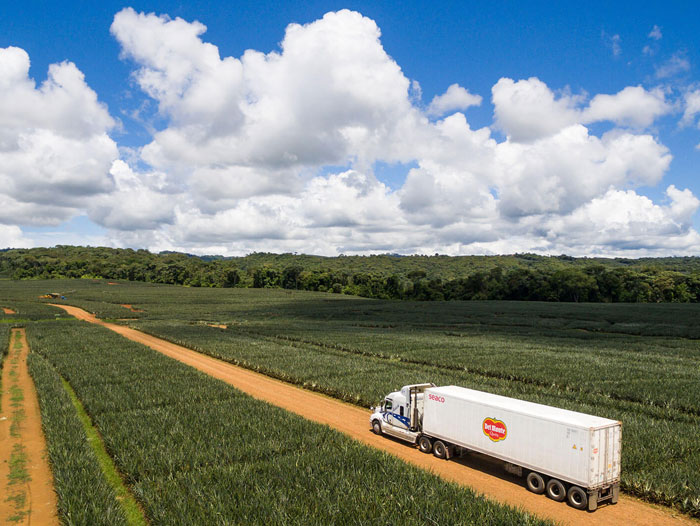Fresh Del Monte and GIZ Strengthen Partnership to Further Promote Sustainability in Costa Rica and Guatemala, With Goal to Duplicate in Other Regions
June 30, 2021 | 3 min to read

MIAMI — Fresh Del Monte Produce Inc., one of the world’s largest leading vertically integrated producers, marketers and distributors of high-quality, fresh produce and German Federal Ministry for Economic Cooperation and Development (BMZ) have joined forces to develop a three-year multi-stakeholder partnership with local organizations, government agencies, communities and subsidiaries to maximize the use of natural resources and to ensure the sustainability of landscapes in Costa Rica and in Guatemala.
The partnership aims to continue to restore productive landscapes, boost the economic development of communities that have been impacted by COVID-19, conserve water resources in watersheds, and provide education for the sustainable development in neighboring lands surrounding Fresh Del Monte’s banana and pineapple farms in Costa Rica and Guatemala. Currently 25 percent (10,000+ hectares) of Fresh Del Monte’s farmland has been set aside for conservation efforts benefitting more than 200 Fresh Del Monte collaborators.
“Our goal is to elevate our sustainable agriculture programs beyond just our operations to create resilient and multifunctional landscapes throughout our entire watersheds,” said Hans Sauter, Chief Sustainability Officer and SVP of Research & Development at Fresh Del Monte. “We view this partnership as a powerful opportunity to enhance the capacity of the communities we live and work in, to build a better, more sustainable environment for future generations. With GIZ’s help we’re taking our techniques and learnings from Costa Rica to Guatemala to continue our mission.”
For more than 30 years, Fresh Del Monte’s commitment to Costa Rica’s sustainable development and biodiversity conservation has played an important role in protecting the forests and supporting local communities in their efforts to restore landscapes and promote social and economic development.
“To ensure the sustainability and resilience of the landscapes in the face of climate change, it is necessary to empower stakeholders and secure financial resources to promote the conservation of ecosystems,” said Svenja Paulino, Director of the Biodiversity and Business Program in Central America and the Dominican Republic. “For this reason, it is also important to create awareness in different players – who impact and depend on biodiversity— about the appropriate sustainable development of watersheds and their ecosystem services”.
The development partnership with Fresh Del Monte is part of the develoPPP.de programme that German Development Cooperation, GIZ, implements on behalf of the German Federal Ministry for Economic Cooperation and Development (BMZ), to support cooperation between the private sector and developmental organizations. GIZ plays an important role by assisting in facilitating relationships with government agencies, and will also provide technical expertise in the implementation of activities related to biodiversity, conservation and sustainability.
ABOUT FRESH DEL MONTE
Fresh Del Monte Produce Inc. is one of the world’s leading vertically integrated producers, marketers and distributors of high-quality fresh and fresh-cut fruit and vegetables, as well as a leading producer and distributor of prepared food in Europe, Africa and the Middle East. Fresh Del Monte markets its products worldwide under the DEL MONTE® brand (under license from Del Monte Foods, Inc.), a symbol of product innovation, quality, freshness and reliability for over 135 years. The Company also markets its products under the MANN™ brand and other related trademarks. Fresh Del Monte Produce Inc. is not affiliated with certain other Del Monte companies around the world, including Del Monte Foods, Inc., the U.S. subsidiary of Del Monte Pacific Limited, Del Monte Canada, or Del Monte Asia Pte. Ltd. Fresh Del Monte is the first global marketer of fruits and vegetables to commit to the “Science Based Targets” initiative. Fresh Del Monte Produce is traded on the NYSE under the symbol FDP.
ABOUT GIZ
The GIZ supports the German Government in achieving its goals of systematically integrating biodiversity into politics and society and thus combating the causes of biodiversity loss. A central aspect is working with economic sectors that are currently making a significant contribution to reducing biological diversity. The “Biodiversity Check Agrícola”, designed by GIZ, not only made it possible to determine the level of relevance that biodiversity has for the company, but also to open a dialogue about which measures should be implemented to voluntarily integrate biodiversity in the company management.
